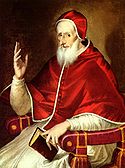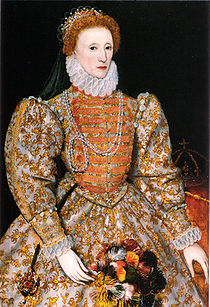
Regnans in Excelsis
Encyclopedia


Papal bull
A Papal bull is a particular type of letters patent or charter issued by a Pope of the Catholic Church. It is named after the bulla that was appended to the end in order to authenticate it....
issued on 25 February 1570 by Pope Pius V
Pope Pius V
Pope Saint Pius V , born Antonio Ghislieri , was Pope from 1566 to 1572 and is a saint of the Catholic Church. He is chiefly notable for his role in the Council of Trent, the Counter-Reformation, and the standardization of the Roman liturgy within the Latin Church...
declaring "Elizabeth
Elizabeth I of England
Elizabeth I was queen regnant of England and Ireland from 17 November 1558 until her death. Sometimes called The Virgin Queen, Gloriana, or Good Queen Bess, Elizabeth was the fifth and last monarch of the Tudor dynasty...
, the pretended Queen of England
Queen regnant
A queen regnant is a female monarch who reigns in her own right, in contrast to a queen consort, who is the wife of a reigning king. An empress regnant is a female monarch who reigns in her own right over an empire....
and the servant of crime" to be a heretic
Heresy
Heresy is a controversial or novel change to a system of beliefs, especially a religion, that conflicts with established dogma. It is distinct from apostasy, which is the formal denunciation of one's religion, principles or cause, and blasphemy, which is irreverence toward religion...
and releasing
Papal deposing power
The papal deposing power was the most powerful tool of the political authority claimed by and on behalf of the Roman Pontiff, in medieval and early modern thought, amounting to the assertion of the Pope's power to declare a Christian monarch heretical and powerless to rule.Pope Gregory VII's...
all her subjects from any allegiance
Allegiance
An allegiance is a duty of fidelity said to be owed by a subject or a citizen to his/her state or sovereign.-Etymology:From Middle English ligeaunce . The al- prefix was probably added through confusion with another legal term, allegeance, an "allegation"...
to her and excommunicating
Excommunication
Excommunication is a religious censure used to deprive, suspend or limit membership in a religious community. The word means putting [someone] out of communion. In some religions, excommunication includes spiritual condemnation of the member or group...
any that obeyed her orders.
The bull, written in Latin
Latin
Latin is an Italic language originally spoken in Latium and Ancient Rome. It, along with most European languages, is a descendant of the ancient Proto-Indo-European language. Although it is considered a dead language, a number of scholars and members of the Christian clergy speak it fluently, and...
, is named from its incipit
Incipit
Incipit is a Latin word meaning "it begins". The incipit of a text, such as a poem, song, or book, is the first few words of its opening line. In music, it can also refer to the opening notes of a composition. Before the development of titles, texts were often referred to by their incipits...
, the first three words of its text, which mean "ruling from on high" (a reference to God
God
God is the English name given to a singular being in theistic and deistic religions who is either the sole deity in monotheism, or a single deity in polytheism....
). Among the queen's offences, "She has removed the royal Council, composed of the nobility of England, and has filled it with obscure men, being heretics."
The Papacy had previously reconciled with Mary I
Mary I of England
Mary I was queen regnant of England and Ireland from July 1553 until her death.She was the only surviving child born of the ill-fated marriage of Henry VIII and his first wife Catherine of Aragon. Her younger half-brother, Edward VI, succeeded Henry in 1547...
, who returned the Church of England
Church of England
The Church of England is the officially established Christian church in England and the Mother Church of the worldwide Anglican Communion. The church considers itself within the tradition of Western Christianity and dates its formal establishment principally to the mission to England by St...
to Catholicism
Catholicism
Catholicism is a broad term for the body of the Catholic faith, its theologies and doctrines, its liturgical, ethical, spiritual, and behavioral characteristics, as well as a religious people as a whole....
. After Mary's death in November 1558, Elizabeth's Parliament passed the Act of Supremacy of 1559
Act of Supremacy 1559
The Act of Supremacy 1558 was an Act of the Parliament of England, passed under the auspices of Queen Elizabeth I of England. It replaced the original Act of Supremacy 1534 issued by Elizabeth's father, Henry VIII, which arrogated ecclesiastical authority to the monarchy, and which had been...
, which re-established the Church of England
Church of England
The Church of England is the officially established Christian church in England and the Mother Church of the worldwide Anglican Communion. The church considers itself within the tradition of Western Christianity and dates its formal establishment principally to the mission to England by St...
’s separation from the Catholic Church. This bull can be seen as an act of retaliation for the religious settlement, but as it was delayed by eleven years it was most likely instigated by pressure from Philip II of Spain
Philip II of Spain
Philip II was King of Spain, Portugal, Naples, Sicily, and, while married to Mary I, King of England and Ireland. He was lord of the Seventeen Provinces from 1556 until 1581, holding various titles for the individual territories such as duke or count....
, the Duke of Norfolk
Thomas Howard, 4th Duke of Norfolk
Thomas Howard, 4th Duke of Norfolk, KG, Earl Marshal was an English nobleman.Norfolk was the son of the poet Henry Howard, Earl of Surrey. He was taught as a child by John Foxe, the Protestant martyrologist, who remained a lifelong recipient of Norfolk's patronage...
or Mary, Queen of Scots, all of whom had a vested interest in overthrowing Elizabeth. The delay was caused in part by a number of royal Catholic suitors who hoped to marry Elizabeth, and because she had tolerated Catholic worship in private. The Bull was issued in support of, but following, the 1569 "Northern Rebellion" in England, and the first Desmond Rebellion in Ireland, with foreign Catholic support, and hardened her opinion against her landowning Catholic subjects.
Aftermath of the bull
The bull provoked the English government into taking more repressive actions against the JesuitsSociety of Jesus
The Society of Jesus is a Catholic male religious order that follows the teachings of the Catholic Church. The members are called Jesuits, and are also known colloquially as "God's Army" and as "The Company," these being references to founder Ignatius of Loyola's military background and a...
, whom they feared to be acting in the interests of Spain
Spain
Spain , officially the Kingdom of Spain languages]] under the European Charter for Regional or Minority Languages. In each of these, Spain's official name is as follows:;;;;;;), is a country and member state of the European Union located in southwestern Europe on the Iberian Peninsula...
and the papacy. This reaction soon seemed justified: it was the publication in England of Pius's exhortation that gave the impetus to the Ridolfi plot
Ridolfi plot
The Ridolfi plot was a plot in 1570 to assassinate Queen Elizabeth I of England and replace her with Mary, Queen of Scots. The plot was hatched and planned by Roberto di Ridolfi, an international banker who was able to travel between Brussels, Rome and Madrid to gather support without attracting...
, in which the Duke of Norfolk
Thomas Howard, 4th Duke of Norfolk
Thomas Howard, 4th Duke of Norfolk, KG, Earl Marshal was an English nobleman.Norfolk was the son of the poet Henry Howard, Earl of Surrey. He was taught as a child by John Foxe, the Protestant martyrologist, who remained a lifelong recipient of Norfolk's patronage...
was to kidnap or murder Queen Elizabeth, install Mary, Queen of Scots, on the throne and then become de facto king by marrying her.
Suspension 1580–84
At the request of the Jesuits and to relieve the pressures on Catholics in England, Pope Gregory XIIIPope Gregory XIII
Pope Gregory XIII , born Ugo Boncompagni, was Pope from 1572 to 1585. He is best known for commissioning and being the namesake for the Gregorian calendar, which remains the internationally-accepted civil calendar to this date.-Youth:He was born the son of Cristoforo Boncompagni and wife Angela...
issued a clarification or suspension in 1580, explaining that Catholics should obey the queen outwardly in all civil matters, until such time as a suitable opportunity presented itself for her overthrow. Soon after the start of the Anglo-Spanish War (1585–1604) an English Act "against Jesuits, seminary priests and other such like disobedient persons" was passed into law.
Renewal in 1588
In 1588 Pope Sixtus V, in support of the Spanish ArmadaSpanish Armada
This article refers to the Battle of Gravelines, for the modern navy of Spain, see Spanish NavyThe Spanish Armada was the Spanish fleet that sailed against England under the command of the Duke of Medina Sidonia in 1588, with the intention of overthrowing Elizabeth I of England to stop English...
, renewed the solemn bull of excommunication against Queen Elizabeth I, for the regicide
Regicide
The broad definition of regicide is the deliberate killing of a monarch, or the person responsible for the killing of a monarch. In a narrower sense, in the British tradition, it refers to the judicial execution of a king after a trial...
of Mary, Queen of Scots in 1587 as well as the previously catalogued offences against the Catholic Church. During the threat of invasion by the Spanish Armada, it transpired that most of the Catholic residents in England remained loyal, and that those who were a real threat to the throne, like Cardinal William Allen and Robert Parsons
Robert Parsons (priest)
Robert Persons , later known as Robert Parsons, was an English Jesuit priest.-Early life:...
, were already exiles.
While the Bull had little impact in England, it caused a rift in Elizabeth's Kingdom of Ireland
Kingdom of Ireland
The Kingdom of Ireland refers to the country of Ireland in the period between the proclamation of Henry VIII as King of Ireland by the Crown of Ireland Act 1542 and the Act of Union in 1800. It replaced the Lordship of Ireland, which had been created in 1171...
where most of the population remained Roman Catholic; Gerald FitzGerald, 15th Earl of Desmond
Gerald FitzGerald, 15th Earl of Desmond
Gerald FitzGerald, 15th Earl of Desmond was an Irish nobleman and leader of the Desmond Rebellions of 1579.-Life:...
had used the Bull as justification for the second Desmond Rebellion. While divisions had existed before 1570, after the Bull the official world based in Dublin conformed to Anglicanism
Anglicanism
Anglicanism is a tradition within Christianity comprising churches with historical connections to the Church of England or similar beliefs, worship and church structures. The word Anglican originates in ecclesia anglicana, a medieval Latin phrase dating to at least 1246 that means the English...
while the majority of the Irish parliament were Catholics until 1613.

